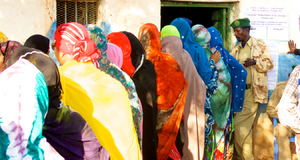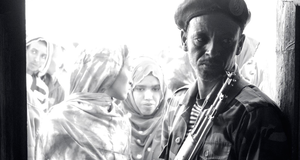Featured Article:Democracy Up Close in Somaliland: Reflections of an International Election ObserverNada and I enter the first station and stand in the only available corner, still about 15-minutes until the polls open. The noise, chaos, and excitement outside is mounting while the polling station staff, mostly young university students and a mix of men and women, prepare the materials for what will be a very long day. When the voting finally begins, order is maintained for a time. Voters enter, have their fingers inspected, register in the logbook, and cast their ballot. At least, this is how it is supposed to work. Virtually all of Somaliland is extremely rural and illiteracy is high – close to 80% in 2001 – so in these elections candidates and parties are identified by numbers according to the assumption that most people possess basic numeracy (an assumption rooted in the rise of cell phones, which are extremely popular and widely used across Africa, and patterns of day-to-day economic activity). However, even this system of numeracy is not understood by all and a high proportion of voters enter with small printed cards indicating their intended vote. When the card is presented to the chair, the ballot is filled out on behalf of the voter, confirmed by each party agent, and set into the ballot box. When so many voters use these cards, however, voter confidentiality becomes an important consideration; in our observations, probably close to 50% of all votes ended up visible to everyone in the room. Given the situation, this is a difficult issue to overcome. We remain at the first polling station for thirty minutes before departing, filling out checklists and writing comments as we go. This is just the first station of the day: we have a list of twenty-five polling stations to visit in the next eleven hours. Unfortunately, what we do not have is a map, nor are there any road signs at all – roads themselves apparently missing – outside of the capital. This is a giant challenge in the planning process, considering that most of the polling stations are many miles apart over rough roads. Although our driver is able to identify several towns from the list, most are unknown to all. Even the Mayor of Salaxley, who we were finally forced to approach for help, couldn’t help us locate every station. As we attempt to establish some sort of route, we in the meantime visit two additional polling stations within a few minutes drive of Salaxley proper. When we arrive at the next station – ‘Salaxley B’ – the scene is somewhat different. Many more people, much more chaos. There are two ballot boxes at this station and four lines (two each for men and women). The closest line appears to be verging on a riot. Everyone is yelling, and two men begin swinging at each other with wooden canes. Inevitably, everyone must be involved and the pushing and shouting mounts swiftly. Our own SPU agent appears to enjoy this environment and, bolstered by his own military fatigues and rifle, immediately enters the fray. He grabs a man by the collar and shoves him out of the crowd. Someone begins blowing a whistle, which seems to be an alert of sorts. Nada and I hang back, looking toward our vehicle and considering the risk of continuing to watch from the fringe. Interestingly, the second set of lines, not even a hundred feet away but leading toward a different polling room, appear totally unfazed by the nearby chaos and instead everyone stands patiently waiting. We enter the second room, bolstered by the peaceful and quiet queue out front. As we enter, the first thing that is immediately apparent is that the second ‘scrutineer’ – the one who is supposed to be applying indelible ink – is clearly not doing so. This was uncommon over the course of the day, but perhaps it was influenced by the chaos outside. The next voter enters, and it is clear to me that he cannot possibly be older than 12 or 13. Certainly not old enough to drive in any country! Thankfully, Nada is able to translate to me as the young man spins his story: to my surprise, the chair waves the boy on to cast his ballot. Later as we are leaving the station, I notice an entire row of young boys queuing to vote, some probably only 10-years old. But before we leave, another interesting event occurs: Nada and I watch as our SPU agent walks calmly into the station, rifle over one shoulder, registers for a ballot, casts his vote, and walks out, neatly walking right past the station where he is supposed to have his finger marked. This is all fine, except we watched him do the same thing 15-minutes prior at the first polling station! I realize quickly that this process is infinitely more complicated than I ever could have anticipated. ___________________ The drive from Salaxley to the next station is long, and it is now hot. The driver has asked around and identified what is supposed to be the next closest station. As we leave the town behind and head off into the bush, I am perplexed at how the driver can possibly know where we are going. Every direction appears as more of the same, and as the drive bumps along and the sun rises higher in the sky, all I can think is that my half empty water bottle will not last very long if the vehicle breaks down. My well-watered self would not last one afternoon in this bone-dry environment. I share this sentiment with Nada, which she finds quite funny: we agree that she would hands down out-survive me because of her Somali blood. Panoramic views fly by our windows, but the drive seems never-ending. It is only 8:30am, but we've been up since 3:30 and on the road since 4am. This will be a long day. Fortunately, Nada and I find much to talk and laugh about. We are, at the outset, very different people, raised in utterly different places, accustomed to divergent cultural practices, and holding dear wildly different ideas about faith. But what we quickly discover is that none of these impede our ability to connect, and indeed, we do. Talking passes the time and makes light of the fact that we're completely disconnected from the rest of the world, hours from anything familiar. ___________________ Although the polling stations become more rural, farther and farther apart, we notice the same patterns repeatedly. One of the first things we realize is that the supposedly 'indelible' ink, the primary bulwark against multiple voting, is hardly indelible at all. In some cases, the ink is simply insufficiently applied. In the afternoon, it is clear that many people, particularly men, are reluctant to have their fingers inked. Some men attempt to wriggle away from a 'full dip,' in which case the scrutineer must be extra-assertive in grabbing the voter's wrist and jamming the finger into the ink container. But when the scrutineer is a woman, which was often the case, this task is more difficult. It was common to watch voters pull a rag from their pocket immediately after having their fingers inked in order to quickly wipe the ink away before it set. Outside the stations, another phenomenon is observed: typically on the side or behind the polling station, an informal 'de-inking' station is set up where voters can use bleach or other substances to try and remove the ink, or otherwise apply some kind of oil prior to voting in order to prevent the ink from sticking. Unfortunately, the voting stations we visited had no way to deal with this ambitious behavior, and therefore a great deal of responsibility fell on the scrutineers to both wipe fingers before applying ink, and to be vigorous in its application. Where scrutineers were typically the least trained members of the polling station staff, this process was not always effective.Continued on Next Page » Suggested Reading from Inquiries Journal
Inquiries Journal provides undergraduate and graduate students around the world a platform for the wide dissemination of academic work over a range of core disciplines. Representing the work of students from hundreds of institutions around the globe, Inquiries Journal's large database of academic articles is completely free. Learn more | Blog | Submit Latest in Political Science |


















